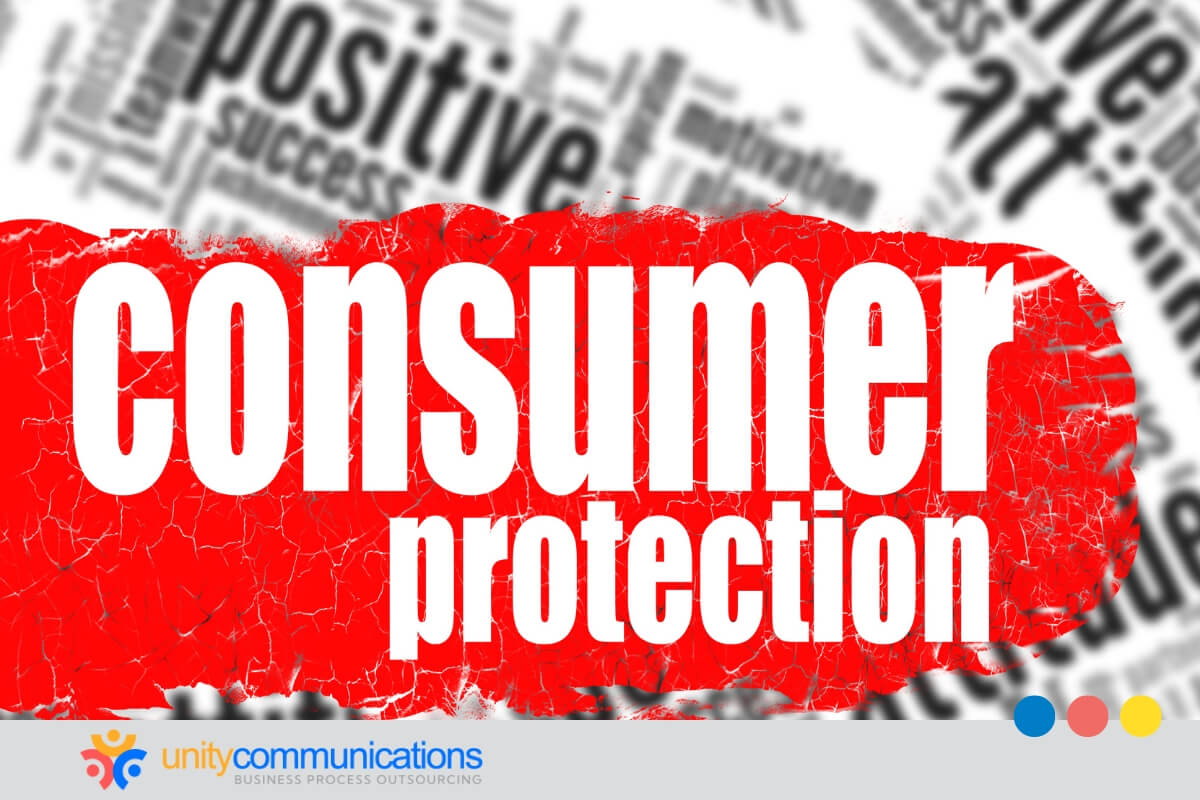IN THIS ARTICLE
Table of Contents
Business process outsourcing (BPO) providers should stay informed about the latest advertising standards, guidelines, and best practices. Adhering to these standards ensures legal compliance and builds trust with clients, fostering a positive reputation in the advertising space.
This article discusses the interconnection of BPO operations and advertising laws. It discusses relevant advertising laws and the best practices that BPO companies must follow to comply with them.
Aspects of advertising laws that BPO companies must know

While the BPO industry itself is not directly involved in advertising, BPO organizations that handle related processes or work with clients in the industry must be aware of applicable advertising laws. Here are some key aspects of advertising laws that are relevant to BPO operations:
- Truth in advertising. Advertisements must be truthful and not misleading. BPO companies supporting advertising practices must ensure that the content they create or manage adheres to truth-in-advertising principles, avoiding false claims or deceptive advertising.
- Regulations on specific industries. Some industries have specific advertising laws and regulations that BPO companies should know. For example, ads must accurately represent pharmaceutical products’ benefits, risks, and side effects. For prescription drugs, direct-to-consumer advertising is also prohibited or tightly regulated.
- Digital advertising and online marketing laws. BPO companies engaged in digital advertising or online marketing should be familiar with regulations related to online advertising. These include rules governing email marketing, social media advertising, and the use of cookies for targeted advertising.
- Endorsement and testimonial guidelines. If BPO operations involve managing endorsements or testimonials for advertising purposes, adherence to transparency and authenticity guidelines is crucial. The Federal Trade Commission (FTC) provides guidelines on endorsements and testimonials.
- Comparative advertising laws. Some jurisdictions regulate comparative advertising to prohibit unfair competition. BPO companies creating comparative advertisements should learn such laws to avoid legal issues.
BPO and core advertising laws that affect it

BPO and advertising are two distinct fields that each have their own set of laws. BPO companies should stay informed about the evolving regulatory landscape and ensure that their operations comply with the provisions of various advertising regulations and standards. Compliance is crucial to avoid potential investigations, penalties, or legal actions by the FTC.
Let’s explore some key considerations for advertising in BPO.
Federal Trade Commission Act
The FTC Act significantly impacts advertising in BPO operations, particularly when BPO companies are involved in advertising services or supporting clients engaged in the business practice.
The FTC is focused on consumer protection and fair competition, and its regulations and guidelines shape the legal landscape for advertising activities. Here’s how the FTC Act affects advertising in BPO operations:
- Deceptive advertising. The FTC Act prevents deceptive advertising practices. BPO companies creating advertising content must ensure that the ads are truthful. Any false advertising leads to scrutiny. For example, the FTC ruled against Intuit because it deceived consumers with misleading ads promoting “free” tax-filing products.
- Consumer protection. BPO operations supporting advertising campaigns must adhere to consumer protection principles outlined in the FTC Act. This includes avoiding unfair or deceptive practices that could harm consumers. Ensuring transparency and providing accurate information are crucial aspects of compliance.
- Endorsement and testimonial guidelines. Ads featuring a consumer endorsement about a product’s key attribute imply that the endorser’s experience is typical for most buyers under real-world conditions. Advertisers must have enough evidence to support this claim. BPO companies involved must ensure compliance with these guidelines.
- Digital advertising and online marketing. The INFORM Consumers Act mandates online marketplaces to authenticate the identities of frequent third-party sellers and simplify the process for consumers to report questionable behavior. Compliance with FTC guidelines is necessary for BPO companies engaged in online advertising services.
- Privacy and data protection. If BPO operations involve handling consumer data for targeted advertising, compliance with data protection laws and the FTC’s privacy guidelines is crucial. The FTC pays attention to how companies collect, use, and secure consumer data, ensuring privacy rights are respected.
- Investigations and enforcement. The FTC has the authority to investigate and take enforcement actions against businesses engaged in unfair or deceptive advertising practices. BPO companies supporting advertising activities may be subject to investigations, penalties, or corrective actions if they violate FTC regulations.
Online advertising standards
The worldwide digital advertising market is huge, valued at $609 billion, and it will continue to grow at a 3.97% compound annual growth rate (CAGR) by 2027. Online advertising standards are crucial in shaping the digital marketing and advertising space, including activities within BPO. These standards promote transparency, ethical practices, and a positive user experience.
Here’s how online advertising standards can impact advertising in BPO operations:
- Ad transparency and disclosure. Standards often require clear and conspicuous disclosure of ad relationships, sponsored content, and endorsements. Transparent businesses establish customer trust and loyalty. Research by Forrester shows that individuals typically evaluate a company based on honesty, capability, and openness.
- User experience. Standards aim to enhance user experience by discouraging disruptive or intrusive ad formats. BPO operations should know guidelines on ad placements, sizes, and formats to prevent negative experiences. For example, Meta prohibits overly sensitive or negative content to ensure a positive user experience.
- Anti-fraud measures. Online advertising standards address fraud prevention to maintain the integrity of digital advertising ecosystems. BPO companies must implement measures to prevent ad fraud and ensure that the campaigns they support meet industry standards for legitimacy.
- Ad targeting practices. Standards often cover practices related to ad targeting, ensuring that advertisers and BPO operations follow ethical guidelines in reaching specific audience segments. Compliance with rules on discriminatory or invasive targeting practices is crucial.
- Accessibility considerations. Online ads are inclusive and accessible to people with disabilities when they adhere to accessibility standards. BPO operations should be mindful of creating ad content that meets accessibility guidelines.
- Industry self-regulation. Many online advertising standards are part of industry self-regulation efforts. BPO operations should be familiar with and participate in relevant industry initiatives to maintain ethical advertising practices.
Why BPO companies must know advertising laws and regulations
Understanding and adhering to advertising laws is crucial for legal compliance. Violating advertising regulations can lead to legal consequences, including fines and penalties. For example, the cease-and-desist violation fines could reach $51,744 per infraction.
Moreover, clients in the advertising industry rely on BPO companies to assist them in creating and managing campaigns that comply with legal standards. Failure to comply with advertising laws can erode trust between BPO providers and their clients, potentially damaging the reputations of both parties.
Lastly, advertising laws are designed to protect consumers from deceptive, misleading, or unfair advertising practices. BPO companies play a crucial role in shaping and executing advertising campaigns, and adherence to these laws is essential to protecting consumers’ rights and well-being.
Best practices for ensuring compliance with advertising laws

Ensuring compliance with advertising laws is critical for BPO companies engaged in advertising-related services. So, what is BPO’s role in complying with advertising laws? Here are some best practices to help BPO companies maintain legal compliance with advertising laws:
- Thorough legal understanding. Invest in legal expertise or consultation to ensure a comprehensive understanding of advertising laws and regulations in the local jurisdiction and any international markets served.
- Regular training and education. Conduct regular training sessions to update employees on the latest federal laws, advertising regulations, industry standards, and best practices. This ensures that staff members are well-informed and can prioritize compliance in their day-to-day activities.
- Effective compliance team. Form a dedicated BPO compliance team responsible for monitoring, interpreting, and implementing advertising laws. This team should work closely with legal experts to ensure ongoing compliance.
- Transparent advertising practices. Promote transparency in advertising practices. Disclose sponsored content, endorsements, and connections between the advertiser and the BPO company. Follow FTC guidelines on transparency and disclosure.
- Anti-fraud measures. Implement anti-fraud measures to prevent and detect fraudulent activities. This includes monitoring for click fraud, ensuring the legitimacy of traffic sources, and adhering to industry standards for ad fraud prevention.
- International compliance. If operating internationally, understand and comply with advertising laws in each target market. This includes respecting cultural sensitivities, language requirements, and legal nuances specific to different regions.
The bottom line
BPO companies involved in advertising-related services must be well-informed about advertising laws and regulations to ensure legal compliance, build client trust, protect consumers, mitigate risks, and maintain a positive industry reputation.
Continuous education and up-to-date knowledge of changes in advertising laws are essential for BPO providers to successfully navigate the complex regulatory landscape.
Let’s connect if you want to learn more about outsourcing services.





